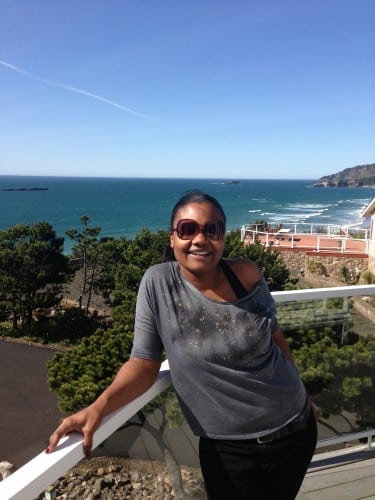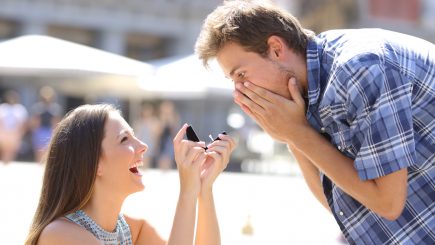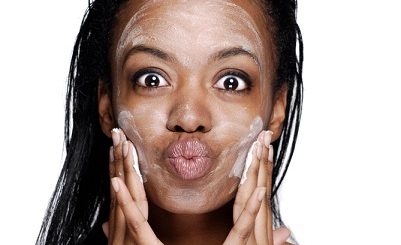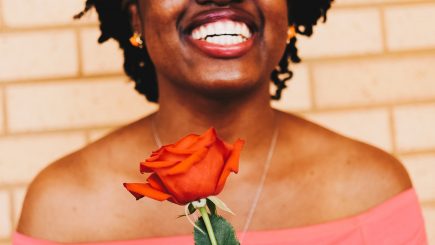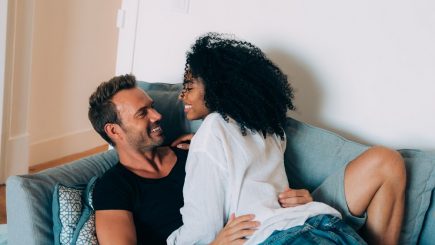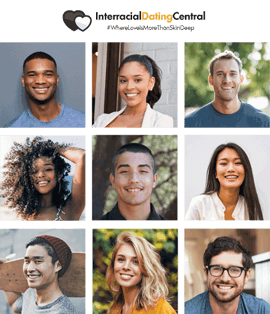By: Kesha Fisher
He was a single man and two daughters made up my world. We set off on a quixotic journey, bumping into love and marriage along the way. Then came the house, the children doubled, and a rescue dog sealed the deal. I had the perfect family as far as I was concerned. The children were happy and healthy, and I was married to a man who incited my happiness on a near daily basis. Our life was filled with love, laughter, struggles, fears, celebration of all successes and deep appreciation for the lessons that came from failures. It was perfect indeed, until we ventured out into the world, where I was often reminded by curt glances and that my family was not ideal.
I was hanging up a picture of my seemingly perfect family one afternoon, when I noticed how different we all looked from the family of my childhood dreams. I chuckled, remembering a discussion I once had with my best friend, Eunice, about which of our classmates we wanted to marry. She mentioned that Azuka was perfect for me. Her reasons included these facts: he was the tallest boy in class, he generously shared his lunch money, and he had just told everyone that I was the most beautiful girl in Nigeria. “He wants to marry you,” she said. Granted we were only nine years old with the possibilities of marriage being slimmer than a trampled on coin, still, the other girls teased, “Ah-zoo-kah and Keee-sha forever,” as they twirled around me in circles. I grew angry. I did not want Azuka. He was shorter than me, easily manipulated by others for his lunch money, and he was Igbo. I was Yoruba, and as long as I had known that marriage was in my future, I prayed for a Yoruba man to marry. Although I spoke English as well as Yoruba, it was of the utmost importance that I spend the rest of my life with someone who came from my father’s tribe and spoke all of the same languages as I did. I swore to God that I would never marry anyone who did not meet such a standard.
Even with an American mother, I presumed my future spouse would come from my neighborhood in Ikoyi or somewhere in Lagos. He would be used to eating pounded yam and egusi soup without me having to explain why watermelon seeds were used to thicken soup instead of getting tossed out with the rind. My husband would know. He would come home with akara wrapped in newspaper, greet me in Yoruba, “Bawoni, Iyawo mi,” and sit at the head chair as I doled out the fried bean cakes to our children. We would watch Yoruba movies, and laugh at the exaggerated nuances of our people without anyone needing to explain what anything meant. That was my idea of ideal.
That was also when my world was still so small. When my parents separated, we returned to America with our mother. Living in Texas, I learned quickly that not only were Yoruba boys non-existent in the way I expected, the black boys wanted no part of an African girl who at twelve still wore pig tails and ballet slippers to school. Most of them liked the chipper blonde girl whose clothes accentuated her breasts and high heels sent her soaring so high, she sat alone on a pedestal I could never reach. Those boys called me African booty scratcher and nappy-headed, and wrinkled their brows to my smile. It was a special kind of despair, feeling as if a mate of my own kind would never be an option for me.
Sure I was barely a teenager, and my mind should have been far from thinking about love and marriage, but in middle school America, it was all the rage. Talks of finding mates came with actual discussions about mating. I did not want to have sex with any one, but I did want my very own boyfriend. It was after all the ultimate goal of every child strolling the halls of Beverly Hills Intermediate school. Before math, English or science, everyone wanted to know who was going steady with whom, who so and so liked. Because of this natural need to adapt to my environment, not only did I want the boyfriend, my very own trophy to indicate my attractiveness, I needed him to also be black. However, it was the Mexican boys who liked me. Asian boys glared at me with terrified eyes, and I imagined each one of them shattering into pieces should I even mutter the word hello. White boys were cordial. They responded to my greetings with deliberate smiles, yet each one would wipe his hand on his pants after shaking hands with me.
To my surprise, a white boy named Troy stopped me after science class one day, and handed me a note. In it, he detailed his affection for my dark beauty, my mild personality and kindness. I was to tick a box yes or no to going steady. I smiled as I consumed his warm words and by the end, I ticked no. The letter he returned to me came with colder words, some of which labeled me a racist who cared for what others thought more than my own happiness. He was wrong about me being racist, but I knew he was right about my fear. He didn’t understand that I could not be the black girl strolling down the halls hand in hand with a white boy. I had seen the way other kids treated those girls. Black boys stopped them in their tracks just to point and laugh. Black girls stared and feigned disgust while discussing among themselves the beautiful children that would come from the union, and white girls and boys stared without publically expressing their feelings. After weeks of avoiding Troy in the halls and pretending his letter had not accurately pegged and exposed my truth, I noticed he had disappeared. When I finally found the courage to ask about him, I learned that his family moved away, and I would never get a chance to tell him he had been right.
My priorities changed with the natural progression from adolescence to womanhood. I had spread my wings further west, and ended up in California where the black boys were more accepting of my sundry background. I even dated a couple. One of my boyfriends was Chinese and two were Latino. My first serious relationship with a black man produced two daughters and the relationship ended badly. After two years of dating my new boyfriend, he fell to one knee with quivering lips and shaky hands asking for my hand in marriage. He was taller than me, extremely generous with every part of his life, and Irish American. Nigerians call his kind oyinbo, white man. In all those dreams where I held hands with my spouse, carting our children to and from wherever my dreams took me, I had not seen Kevin’s face anywhere. Until I came to America, I seldom saw white people outside of television for that matter. However, the feelings that manifested from my expectations from a good marriage were encapsulated by the love I felt for this man, and his love for me and my children. He was to me, the perfect man. He was not Yoruba, or black, but he had come into my life and pieced together all the broken pieces of my shaken world. His favorite dish of all the foods I cooked happened to be pounded yam and egusi soup, and we found laughter in all the nuances of our adjoining worlds. I smiled, said yes to the ring and a life with him by my side. We went to Nigeria to wed and his face replaced the man who stood beside me in all those dreams.
We live in America now, and when I am out with my husband, black men stare. Some have even stopped us to ask me, “Why him?” Whites, male and female alike, stare with blatant smiles of approval, and some roll their eyes. Depending on the black woman, I often think they see me as a self-loather or a martyr who has chosen to stand before a firing squad and accept the hits they would not dare risk, who knows, I am not in anyone’s head. I only live in a world where my man happens to come from a place that is different from mine, and my hope is for others to find a similar fulfillment in their own relationships.
The reality of a mixed marriage is one that we have had to get used to. Although we know that being human trumps the differences of skin color, we also acknowledge our dissimilarities. We have different tastes in music, I tease him about his vast preparations before sun exposure, and he jokes about my long and tedious measures with mine and the children’s hair care. We fear the bemusement from others when we joke about race, what it means when my folks shift their way of speaking in his presence and how our children have had to adapt to the changes around them. Fortunately, these complications rarely come into play, so we focus on the good. We know that our little family needs to make sense to only us, and it is exactly as it should be.
I was not the woman of his dreams, and he was not present in any of mine. What matters is that our lives and experiences led us to one another. Melding black and white is no easy task, even in today’s America. But just as there is a time in every day when night becomes day and day returns to night, there are no seams illustrating these differences. It just happens. We know we are not the ideal cake-topper couple, nor do our children match. He has learned to ignore the looks he receives when his black step daughters call him Daddy. I have had to smile and shrug off questions about whether I am the nanny to my blonde-haired, green-eyed daughter. We know that strangers will take these second glances at us and quietly wonder how we came to be, but more importantly, we have decided that our union needs no one’s approval. So, when the world comes into ours to show its disapproval, I simply laugh and say to myself, “It works for us.”
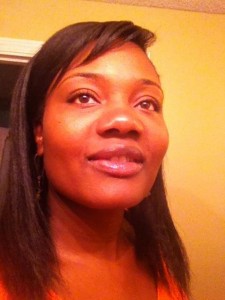 Kesha is a a married mother of four. She lives in the Pacific Northwest, but was raised in Lagos, Nigeria. Kesha is a published fiction writer, with a focus on female inequality specific to African and American cultures. “There was a time in my life when I felt my experiences were solely mine to suffer, until I started writing. Life then opened up, tremendously.” You can follow Kesha on Twitter @keshfish and on Facebook search Kesha L. Fisher Writings.
Kesha is a a married mother of four. She lives in the Pacific Northwest, but was raised in Lagos, Nigeria. Kesha is a published fiction writer, with a focus on female inequality specific to African and American cultures. “There was a time in my life when I felt my experiences were solely mine to suffer, until I started writing. Life then opened up, tremendously.” You can follow Kesha on Twitter @keshfish and on Facebook search Kesha L. Fisher Writings.

